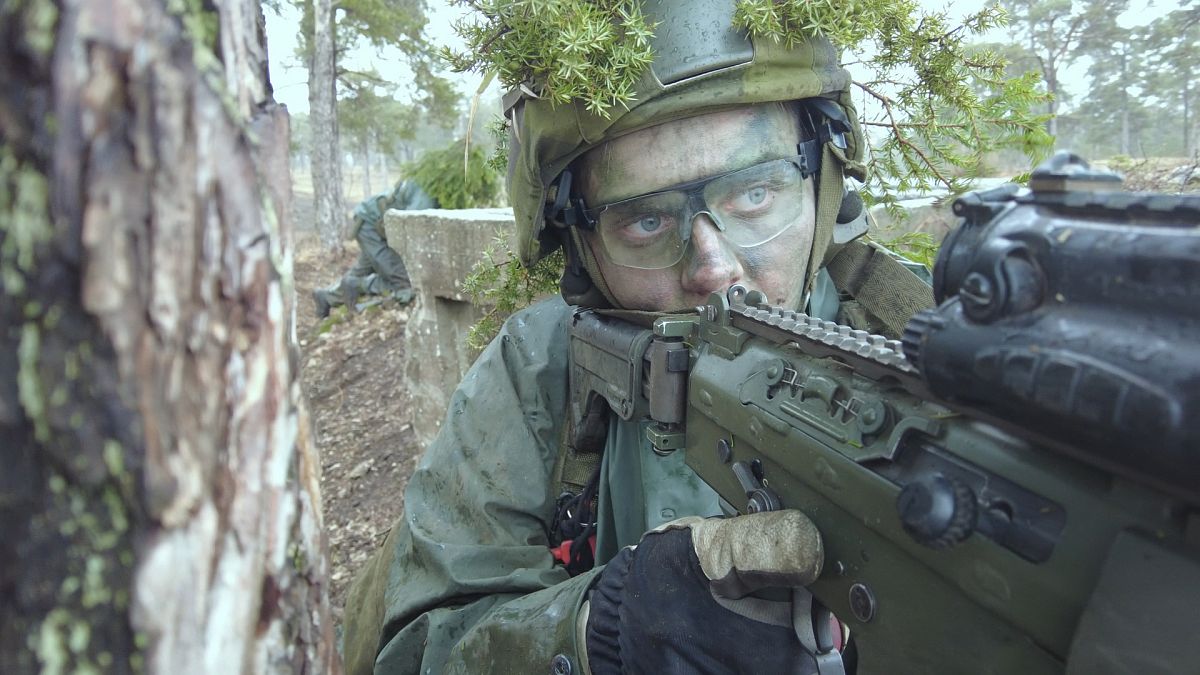After the end of the Cold War, Sweden demilitarized Gotland island in the Baltic sea. Now, in the wake of Putin’s war in Ukraine, Sweden is accelerating its re-armament.
Wet snow turns into drizzling rain. Thanks to some diplomatic backing and the security clearance of the German and French embassies in Stockholm, I got finally authorization from the Swedish armed forces headquarters to enter the military facility on Gotland, a strategically important island in the middle of the Baltic Sea. Crouching down into the muddy soil I try best as I can to catch the tense faces of the young soldiers deployed across the coniferous woodland, passing a hidden tank, pausing behind some rocks for a few seconds, then silently moving further towards a trench that separates a small ridge from a large open meadow. It’s like a choreographed war-ballet, every single fighter fitting smoothly into the well-trained mechanism of their squad. Suddenly some dark silhouettes appear in the grassland ahead. Squad leader Benjamin commands: “Open Fire!”
Building up capabilities
Happily enough, I’ve got some good earplugs, the recruits are using live ammunition for today’s training. All-day long professional soldiers, newcomers and conscripts are mingling in small groups across the huge forest area. It’s about knowledge transfer. About learning how to handle bad surprises. And about how to beat off hostile paratroopers trying to conquer an airfield.
After the end of the Cold War, Sweden demilitarized the island. A somewhat naïve belief prevailed that eternal peace had broken out. Then Russia occupied Crimea, in 2014. The Swedish government reassessed Gotland’s vulnerability – and stationed several hundred soldiers here. Now, with Putin’s war in Ukraine, Sweden has accelerated its re-armament. Gotland regiment commander Magnus Frykvall has a few precious minutes to spend on a short interview.
“What’s on your wish list?”, I want to know, and: “Are you able to defend Gotland in case of any attack?”
“I would love to have more air defence, I would like to have more tanks”, Frykvall responds. “But I need to stress that we are building that capability right now. We have a high readiness on Gotland. Gotland can be defended and will be defended.”
Opposition parties call for fast-track NATO membership
Is there a real risk that Russia could grab Gotland? In Stockholm, I pose the question to Hans Wallmark, Foreign Affairs spokesperson of one of the main opposition parties, Moderaterna:
“Can you rule out any kind of military action from the Russian side against the Baltic States, against your state, against Gotland?”, I ask. Wallmark is straightforward, delivering short and sharp answers: “No, and that is the reason why we need to join NATO.”
“When will Sweden join NATO?”, I ask Wallmark.
His answer: “Well, I hope that we can vote in Parliament before summer, so that we can join NATO as an incoming country at the Madrid summit in late June.”
Already in 1808, the Russians invaded Gotland. Four weeks later Sweden threw them out again. And today? If Sweden joins NATO, Moscow could arm Iskander missiles in the nearby Russian Kaliningrad enclave with nuclear warheads.
There is speculation that Russia wants to conquer Gotland to put S-400 missiles there. This would enable Moscow to control all the Baltics. But protected by NATO membership, Sweden’s territory would be “Hands off!” for Russia.
Sweden and Finland are members of the European Union – but not of NATO. Putin’s war in Ukraine is heating up the debate: more and more people want to get under the protective shield of the western defence alliance. It’s a hot topic in the upcoming Swedish election campaign. Throughout this assignment in April I have several background talks with well-informed sources in the Swedish capital and gather clear signals that the country is going to abandon its historical non-alignment and joins NATO soon, together with Finland.
Putin’s war in Ukraine triggered a change in public opinion in Sweden and Finland. Through the decades, both countries were proud of their military non-alignment, but now there is a clear majority in favour of joining the western defence alliance.
Creating a new order for European security
A piece of last-minute information pops up on my smartphone. The Swedish Prime Minister, Magdalena Andersson, has called a short-notice press conference. A bit of to-ing and fro-ing later and a short discussion with the PMs head of communication, I have a window of opportunity to put a few questions to Andersson: “Russia issued a threat towards your government, you are under pressure from Moscow not to join NATO! Given the war in Ukraine, are you considering speeding up a decision on joining NATO soon?”, I ask her.
The Swedish Prime Minister’s answer: “The thing that we are all fighting for is peace in Ukraine – but also European security order. And one central part of it is that it’s up to every country to decide by itself. We make our own decision and we make it at the speed we decide ourselves.”
To get a clearer answer, I go for a follow-up question: “But NATO membership is not excluded?”, I ask Andersson.
Answer: “It is not excluded. We are going to do what we think is best for the safety of Sweden.”
Strong Vikings defending themselves on their own – this traditional Swedish self-perception is slowly fading away. Being confronted with an aggressive superpower in the near neighbourhood, raging war and destruction against a sovereign country on the European mainland, most Swedes would sleep better being protected by NATOs security guarantee as laid down in Article 5 of the defence alliance treaty and reflected in the motto of NATO: All for one and one for all.
